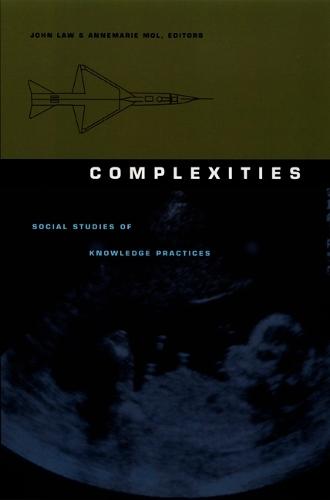Full Product Details
Author: John Law ,
Annemarie Mol
Publisher: Duke University Press
Imprint: Duke University Press
Edition: 2nd
Dimensions:
Width: 15.60cm
, Height: 2.10cm
, Length: 23.50cm
Weight: 0.408kg
ISBN: 9780822328469
ISBN 10: 0822328461
Pages: 277
Publication Date: 10 June 2002
Audience:
Professional and scholarly
,
Professional & Vocational
Format: Paperback
Publisher's Status: Active
Availability: In Print

This item will be ordered in for you from one of our suppliers. Upon receipt, we will promptly dispatch it out to you. For in store availability, please contact us.
Reviews
Extremely timely, important, and well-defined, this book is precisely on target in focusing on heterogeneous studies that treat knowledge as local. The types of science and technology discussed are diverse and well-balanced. -David Stump, coeditor of The Disunity of Science: Boundaries, Contests, and Power
"“Extremely timely, important, and well-defined, this book is precisely on target in focusing on heterogeneous studies that treat knowledge as local. The types of science and technology discussed are diverse and well-balanced.”—David Stump, coeditor of The Disunity of Science: Boundaries, Contests, and Power ""Complexities would be an excellent supplemental text in upper-division undergraduate or graduate courses in logic, philosophy, political science, global human-resource management, or cultural diversity. The real-world nature of the essays and the lack of clear conclusions make the selections in this book an excellent starting point for class discussions and reflective practice exercises. Used effectively, this book should aid students in demonstrating competence in synthesizing, evaluating, and judging the advantages and disadvantages of courses of behavior."" -- Cheryl Crozier Garcia * International Social Science Review * ""This volume begins to address a theme of increasing importance within sociology. Although it is produced form within the field of science and technology studies, it should have a broader appeal among other social scientists, including those who are interested in social theory, cultural studies, communications, management, and organizational research."" -- Anne Gatensby * Contemporary Sociology *"
There is much here to provoke new thought and insight into the meaning of complexity, and the authors do show how any reduction will inevitably require a focusing that is partial and ultimately problematic. . . . Mol should be applauded for trying to see how her story might have some longer term practical utility. But the overall strength of this book lies in its posing more questions than answers-in a quite deliberate way. It is not an easy read, but then that would be asking for a simplification that would hide the very complex(ity) issues the book is trying to reveal. <br>--Andrew Webster, Interdisciplinary Science Reviews
“Extremely timely, important, and well-defined, this book is precisely on target in focusing on heterogeneous studies that treat knowledge as local. The types of science and technology discussed are diverse and well-balanced.”—David Stump, coeditor of The Disunity of Science: Boundaries, Contests, and Power ""Complexities would be an excellent supplemental text in upper-division undergraduate or graduate courses in logic, philosophy, political science, global human-resource management, or cultural diversity. The real-world nature of the essays and the lack of clear conclusions make the selections in this book an excellent starting point for class discussions and reflective practice exercises. Used effectively, this book should aid students in demonstrating competence in synthesizing, evaluating, and judging the advantages and disadvantages of courses of behavior."" -- Cheryl Crozier Garcia * International Social Science Review * ""This volume begins to address a theme of increasing importance within sociology. Although it is produced form within the field of science and technology studies, it should have a broader appeal among other social scientists, including those who are interested in social theory, cultural studies, communications, management, and organizational research."" -- Anne Gatensby * Contemporary Sociology *
“Extremely timely, important, and well-defined, this book is precisely on target in focusing on heterogeneous studies that treat knowledge as local. The types of science and technology discussed are diverse and well-balanced.”—David Stump, coeditor of The Disunity of Science: Boundaries, Contests, and Power
Author Information
John Law is Professor of Sociology and Director of the Centre for Science Studies at Lancaster University in England. Annemarie Mol is Professor of Political Philosophy at Twente University in the Netherlands.



